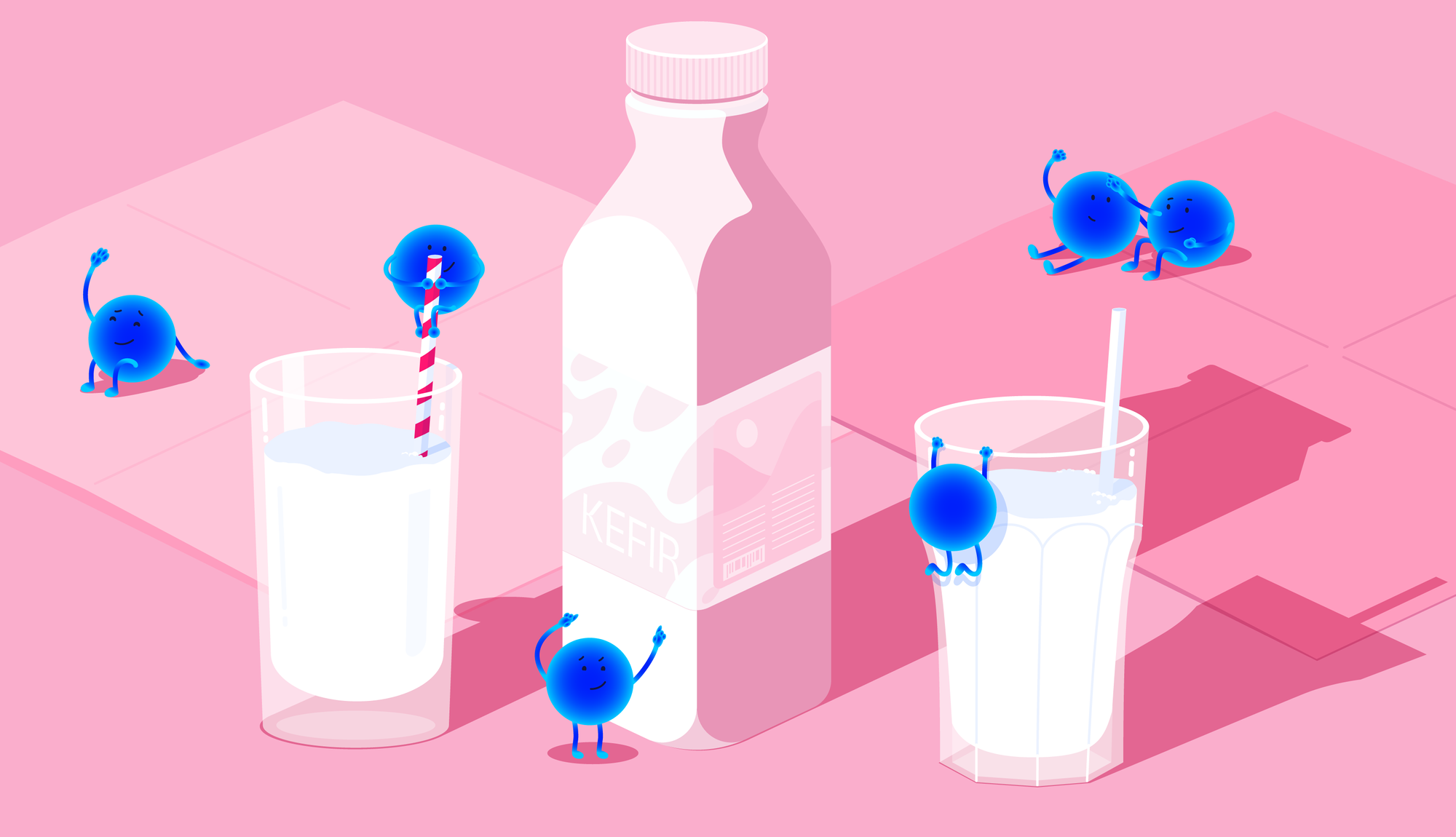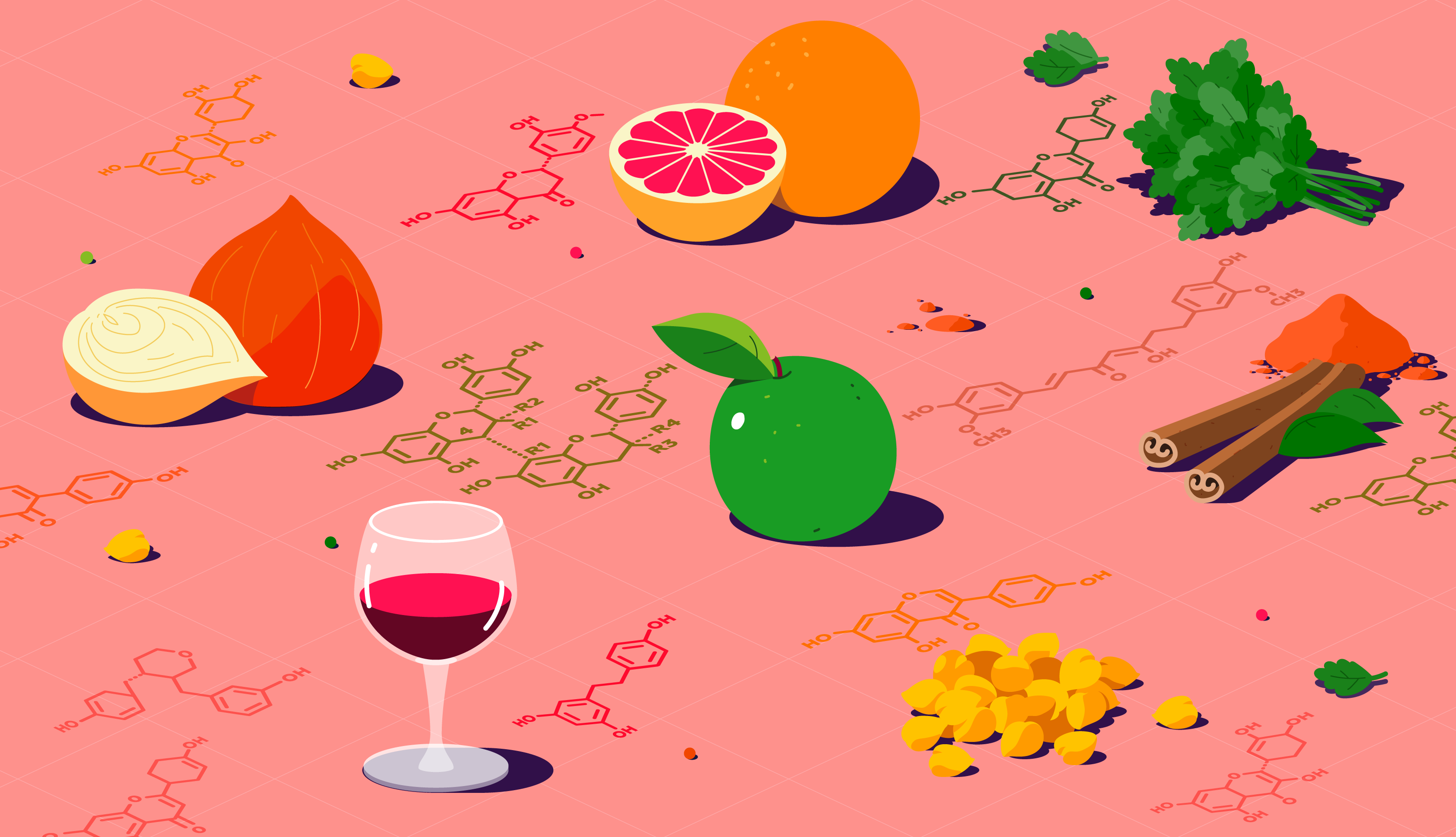Kefir is a trendy fermented beverage made from milk or water. Some attribute weight loss, glowing skin, and digestive excellence to the “extraordinary health benefits of kefir”, but research shows that the benefits of kefir are not quite as clear cut as marketing and social media gurus would have you believe.
Table of contents
- 1. What is kefir?
- 2. What is kefir milk?
- 3. What is water kefir
- 4. Kefir fermentation
- 5. What are kefir grains?
- 6. Kefir health benefits
- 7. Kefir milk benefits
- 8. Kefir nutrition: calories
- 9. Kefir for weight loss
- 10. How to drink kefir
- 11.Best time to drink kefir
- 12.The final word on kefir
Rather than drinking kefir in the hope it will solve everything from acne to excess weight, get science on your side with the current findings on kefir probiotic drinks for your health. Here is what you need to know about this fermented beverage.
☝️TIP☝️ Take the Atlas Microbiome Test to see how well your bacteria are doing and what to eat for better health.
What is kefir?
Kefir is a fermented beverage made from milk or sweetened water. The sour tang is the result of bacteria and yeasts that use the sugars for fuel.
Kefir can also be a bit fizzy because low levels of carbon dioxide and alcohol (not enough to get anyone inebriated) are also produced during fermentation.
| Types of kefir | |
|---|---|
| Cow’s milk kefir | Goat’s milk kefir |
| Water kefir | Coconut water kefir |
What is kefir milk?
Kefir is a fermented milk drink that has the most well-researched health benefits. It is believed to originate in the Caucasus mountains where families fermented milk in goatskin pouches hung on the outer walls of their homes.

Creamy and unctuous, it’s very similar to a thin yoghurt and has been popular for centuries in Eastern Europe and Central Asia, where people have long attributed it with good health.
Milk kefir can be made from nearly any milk: whole or skimmed. Goat’s milk kefir – sometimes known as goat kefir – is a popular option for people who are sensitive to cow’s milk, but it’s harder to find in the supermarket.
Easier to find is Polish kefir that’s usually available in any Eastern European food shop. If you’re looking for goat milk kefir, check out online suppliers in your region or country who offer refrigerated shipping options to keep the bacterial cultures alive during transport.
What is water kefir?
Water kefir is a dairy-free kefir that’s suitable for people who are lactose intolerant or follow a dairy-free diet, like veganism or paleo. However, water kefir grains have a different bacterial profile, so you can’t use milk kefir grains to start a water kefir culture. Popular types of water kefir include those made from coconut water and fruit juice, but you can also just make it from water with added sugar.
Kefir fermentation: how to make kefir at home
You can also make kefir at home. It’s surprisingly easy and it’s a great cost-effective way to have kefir every day. You’ll need to order the kefir grains (or kefir culture) online. They look a bit like tiny cauliflowers and they contain specific live kefir bacteria you need to make this probiotic beverage.

You should put them in milk and ferment at room temperature for a few days (most people keep the kefir in a jar on their kitchen counter). When it’s ready, just strain out the grains, put them in fresh milk, and refrigerate your homemade kefir.
Of course, you could purchase organic kefir grains, but you’d be better advised to invest in organic milk instead. After all, kefir is mostly liquid, so it’s more important to use organic liquids than organic kefir grains.
What are kefir grains and should you eat them?
Kefir grains are produced by the bacteria that make kefir. They come in a variety of sizes from 0.3 cm to 3.5 cm in diameter. Kefir grains have a unique texture, like firm jelly or gelatin, that contain lactic acid bacteria and bacteria that produce acetic acid, both of which are essential in the production of the kefir probiotic beverage.
Although some people do add them to their smoothies, kefir grains are usually kept to make more kefir, and if there are too many, they are simply discarded or even added to the compost bin.
The health benefits of kefir
Milk kefir has a number of confirmed health benefits. However, there is very little research on the health benefits of water kefir, which is a different type of beverage because it’s fermented by another microbial culture.
The health benefits of kefir are not just for digestion, they actually influence other parts of your body, including your immune system, heart, and inflammation. The effects of kefir are not always immediate, and drinking one glass of kefir will not solve your problems.
Studies show that kefir can improve health when people drink it regularly (usually daily for 2–4 weeks). However, many online claims that remain unfounded. For example, there’s no proof that kefir benefits skin health, or that it has exceptional weight-loss powers. As for the question, is kefir fattening? There is equally no evidence that drinking kefir causes weight gain.
Kefir milk benefits
Much research into kefir benefits has preliminarily focussed on rats and mice, demonstrating that it can help control cholesterol levels, protect kidney function, support immune function, and more. However, it’s always more relevant to look at what has been found in humans, because we are much bigger organisms than rodents:
- improved digestion and constipation relief
- suitable for lactose-intolerant people
- reduced fasting blood glucose in diabetics
- oral hygiene and tooth decay prevention
- controlling inflammation in healthy people
- better efficacy and tolerability of Helico pylori treatment
These health attributes can help lower disease risks and even support gut bacterial health according to the team at Atlasbiomed, a company specialised in DNA and gut microbiome testing for health.
If your store-bought kefir is pasteurised before consumption, the end product won’t contain probiotic bacteria. Nevertheless, fermentation reduces the level of sugar in the drink and enhances the nutritional profile with vitamins and other substances that are good for your body.
Kefir nutrition: calories
Many people wonder about kefir calories, but there’s actually no strict answer. It depends on the type of milk used, the duration of fermentation, and other parameters. Longer fermentation of kefir results in higher levels of acetic acid (the basis of vinegar), making it sour, and at a certain point, simply unpalatable.

If you consume a store-bought brand, check the label for the calories in kefir. However, if you make your own homemade kefir, you can’t know for sure how many calories are in it, but you can go by taste. Sweet water kefir and milk kefir that isn’t very sour haven’t undergone enough fermentation and contain more sugars.
How much kefir to drink for weight loss
There is no set amount of kefir to drink for weight loss because the kefir weight loss link is mostly an online myth designed to make you buy kefir products. Rather than focusing on kefir to lose weight, use it as part of a balanced diet with lots of plant-based foods to nourish your body and your gut microbiome.
How to drink kefir
When it comes to how much kefir per day, the answer is simple: kefir in moderation and every day. Rather than bingeing on kefir in the hope that you will lose weight, add a glass of kefir to your daily routine to support your health.
Is there a best time to drink kefir?
There’s no science to say whether drinking kefir morning or night will change anything as to its health attributes. However, it’s worth keeping in mind some recognised practices that can help achieve and maintain healthy body weight, and general health too.

Avoid consuming any calories (drinks or food) about three hours before you go to bed. After all, your digestive tract and your gut bacteria need a break to recover from all the hard work put in during the day. In addition to that, research shows that eating within a window of 8–12 hours per day is optimal for your body, rather than grazing for 16 hours per day.
The final word on kefir
Most research has focused on the benefits of milk kefir for health. This probiotic beverage has the ability to support a range of different health aspects from your oral hygiene to your blood sugar levels.
However, there are a lot of myths out there on the internet, many of which are unsubstantiated but used by marketers to sell their products. Remember that you can also make kefir at home for very little effort. Not only will it enhance your culinary skills, but it’s also a great hobby!
- Effect of Fermentation on Lactose, Glucose, and Galactose Content in Milk and Suitability of Fermented Milk Products for Lactose Intolerant Individuals
- Milk kefir: composition, microbial cultures, biological activities, and related products
- Milk Kefir: Nutritional, Microbiological and Health Benefits



















